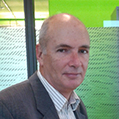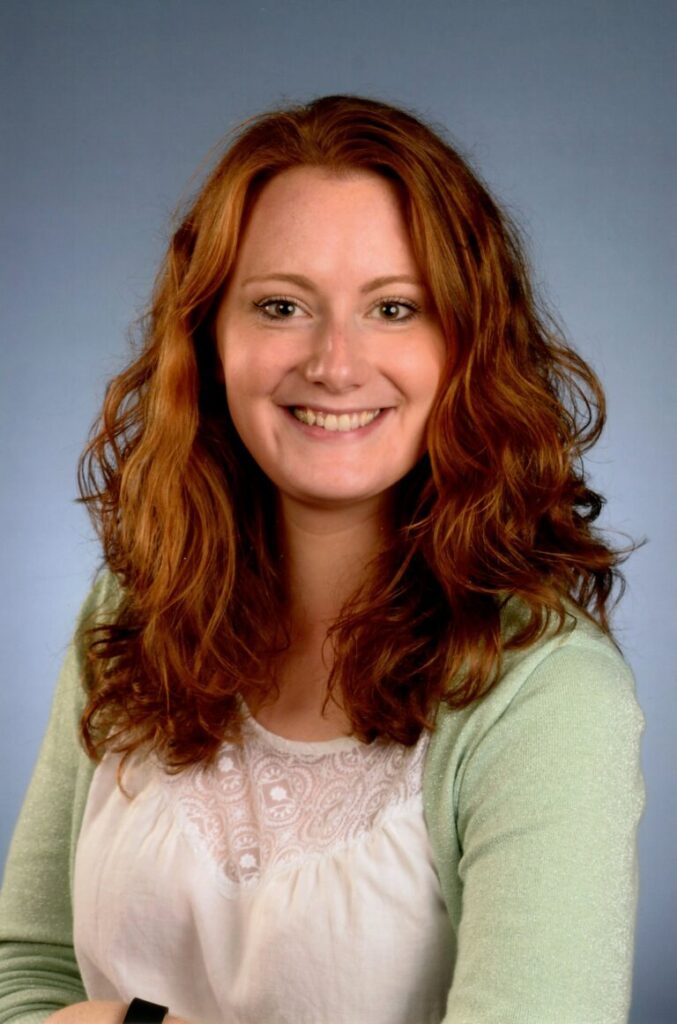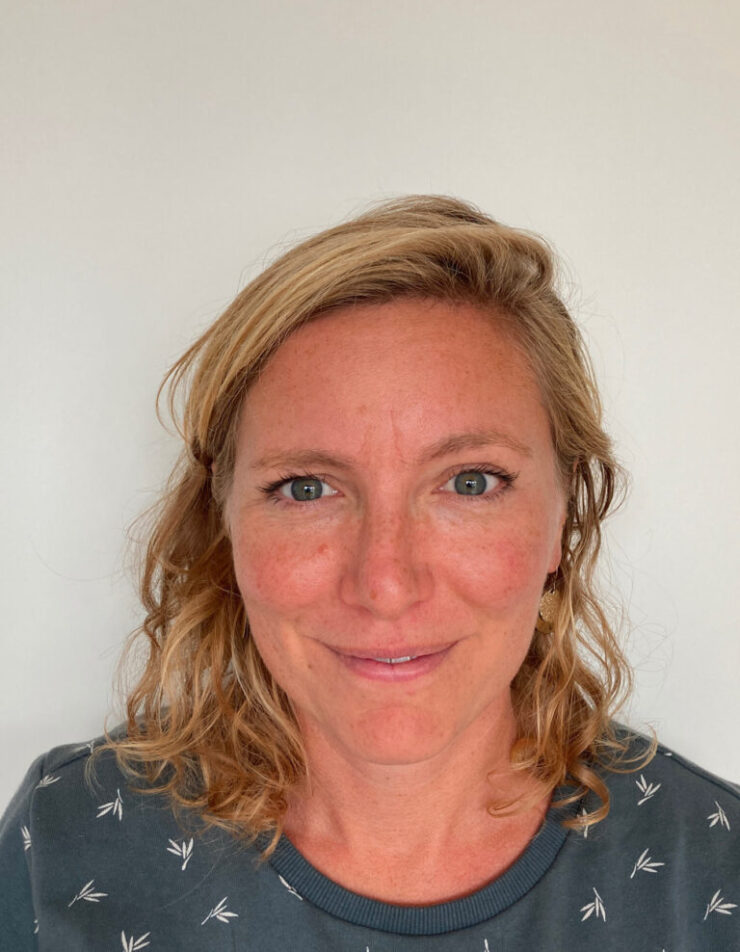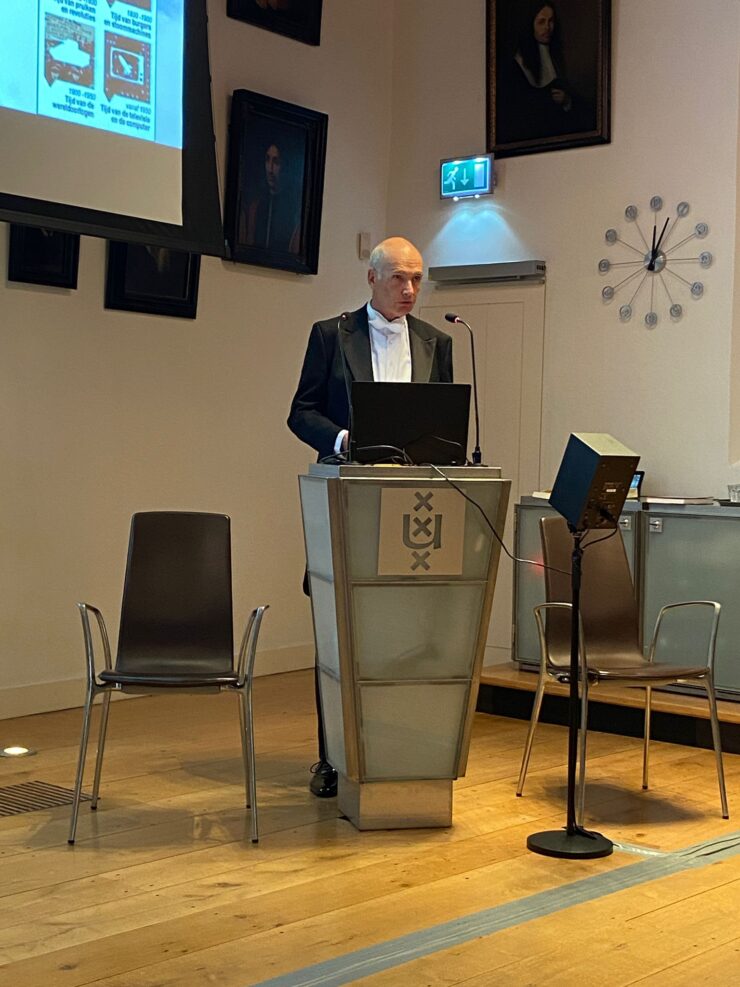Nieuws
Interview met Marc Kropman door Alida Jones & Bregje Prent
Interview with Marc Kropman: the journey towards a doctorate degree
by Alida Jones & Bregje Prent



Embarking on the academic journey towards achieving a doctorate degree is no small undertaking, especially if one is employed in education. The challenge encompasses many aspects: cognitive ability, the identification of a problem that needs solving, the academic know-how to assess the problem, the creativity to propose a solution, and the research skills to carry out the entire process. Above all, the candidate must develop their own system of organization and have a seemingly bottomless well of energy in order to complete the task. The prospect of starting is a daunting one, but like any other journey, the first steps are the most critical. Where is a Ph.D. candidate to start?
Experience cannot be taught, but it can be shared. With this in mind, two historians and novice Dudoc-Alfa candidates, Alida Jones and Bregje Prent, sat down on a rainy morning on 17 January 2022 to interview the newly minted Dr. Marc Kropman. As was the case with so many meetings during the Corona era, the interview was held virtually, with all the usual internet connection hiccups, and two hours – and several steaming mugs of tea – were pleasantly passed in conversation. The time was very well-spent, with the personal experience and advise of the old guard being passed on to the new. And speaking of passing on the torch…
Bregje: Didn’t I serve as your (temporary) replacement at the ILO, together with Antoinette Dobbelmann? Because you were working on your dissertation?
Marc: Oh? How long ago was that?
Bregje: Ten years ago? Nine years ago?
How it all started
Marc: I think that’s correct. I think you replaced me when I was on sabbatical. Now you’ve got me thinking about how all of this started. I had taken a sabbatical for half a year so I could collect and analyze my data, which lead to my first article. After that, my research came to a standstill. I returned to work and was busy with everything except for my research. After a while, I just let it go. I didn’t think I would ever come back to it. Then Carla contacted me because someone had dropped out (from the Dudoc-Alfa teaching grant) after two years. She thought I could use those two years to finish what I had already started. I wrote a proposal and was accepted. This is how I came to be in the program.
My experience was different than the rest of the group. I was the odd duck. I was the oldest, I would only have two years to do this project, and I didn’t take any research courses, like the ICO courses. I did take a crash course in methodology. And, of course, my supervisors played a big role. It also helped that I had reached the age category of 60+, so I fell under a special arrangement in which I could use my time to prioritize my research.
The inspiration
Alida: What inspired you to start the research process that led to the achievement of your doctorate degree?
Marc: It was a slow build-up of my own professional experiences over the years, both as a teacher and as a contributing author and editor to high school textbooks. Over time, my irritation began to grow about the easily made assumption that “they know nothing”. In this case, “they” were both the high school teachers and the students. When I started to look more closely at the problem, I realized this was not the case and certainly not the teachers’ or the students’ fault. What is taught is largely, if not exclusively, shaped by the narrative presented in the textbook. It was the narrative that was the issue, and specifically the master narrative of Dutch national history. So that got me thinking, what is a narrative, exactly? The more research I did, the clearer the issue became. In reading and writing a textbook narrative, more attention needs to be paid towards elements of perspective, the need for more interwoven perspectivity, and the debates this brings. Yet another important narrative element is the language used within narrative, especially the way in which metaphors form and frame the narrative that is presented.
With only two years, I didn’t have time to study and create a theoretical framework, which is usually done in the form of a literature study. It all seemed to happened at the same time. Each article is a job in itself, and each is linked to a greater idea. You write an article, you submit it, and while you wait for a response you give it a rest and go back to the books to read even more. Once you get back feedback, you review the feedback, and you edit and rewrite. As time passed, I noticed – and I’m sure you’ll notice this as well with your own work – that there was a shift in the conceptual processing of the core theories that I had been working on. That is all part of the research process. I discovered, as will you, that the more compact you write your dissertation, the easier it is to maintain your consistency within your theoretical framework.

Challenges
Alida: Were there any particularly frustrating moments during the writing process?
Marc: It’s always deeply frustrating that after all the hard work that goes into writing an article or rewriting an article, it is rejected. One of the worst reasons to be rejected is because your article doesn’t match the intended goals or audience of the publisher. You think, what now? This is why it is so important to have a good working relationship with your supervisors and that you really think about where you want your article to be published.
Once you submit, you’ll always get feedback. It’s also good to submit an article not with the goal of getting published, but with the goal of getting high-quality feedback from someone who is not in your team. There are times when you’re so wrapped up in your work that you need a completely different perspective to make more progress. You work through the feedback like it’s a checklist. You go back and you tinker and tinker and tinker. You discuss it with your supervisors, you read even more related literature, you discuss this again with your supervisors and you rewrite bits or write new bits. Above all, you shouldn’t be afraid to go through your work and strike through large portions of text. I’m not talking about word or sentence level, but entire paragraphs or sections of text. You must keep the reader on track. The strength of your argument is in focusing on a wholly convincing presentation of what you’ve found, and that presentation needs to be one that had a clear overview that the reader can easily follow.
The language
Bregje: Would you say that this made you a better writer? I’m rather worried about writing in English. I’ve never had to write in English before.
Marc: Oh, definitely! I have definitely become a better writer, and not just a better academic writer. Writing in English was also an obstacle for me, but there are things you can do to help yourself. There are several different courses you can take, such as Academic Writing in English. There are also numerous websites that can give you lists of standard words and phrases that you can use. Then it almost becomes an exercise in picking and choosing and creating your own writing formulas. You start to maximize the potential of translation tools by playing around with them to suit your own needs. For example, when using Google Translate, I would enter a sentence in Dutch and then see what the English translation was. I might tweak it a bit, I might not. Then I would enter the translation again, this time from English to Dutch to see if the meaning stayed the same.
Don’t forget that you have a research budget, and you can use some of that money to pay for translation and editing services, like American Journal Experts (or Editors). This is what I used. Just be prepared that whenever you get your work back, it will be a sea of red. You just have to sit down and work your way, one-by-one, through all the comments. Sometimes the changes are small things, like a comma in the wrong place, and sometimes you have to change whole sentences. The first time you have an article edited it might have 120 comments about changes you must make, and you learn from that. The second time you might have 60 comments. It won’t always be perfect, but you definitely get better.
Cooperation
Bregje: It’s wonderful to be able to get feedback from your supervisors and from others, but after all that feedback and rewriting, how much of the work is still yours? What I mean is, how much of the research will still be me?
Marc: Think about it in terms of interaction. The cooperation between you and your supervisors is crucial. In the beginning, everything is new, and you don’t have to feel like you’re alone. You’re used to being a teacher but now you’re the student. You have a lot to learn, but it’s you who is doing the work and it’s your learning process. You will change and grow a lot, but it’s still your work.
Balance
Alida: Throughout the whole process how did you keep a balance? For example, between work and private time? What were the most stressful moments?
Marc: Doing Ph.D. research is fun to do, but it is a lot of hard work. You have to learn to stop: to stop reading and start writing, to stop writing and to submit, to stop the workday and spend time with your family. You are completely wrapped up in the research and there’s also a (teaching) job next to that. You could go on endlessly, but you have to just stop sometimes.
Processing what you read is also important. You have to come up with your own system of organization. The computer is a powerful tool: use folders, EndNote, OneNote. Write summaries of what you read and add keywords. As you go along, also note the exact page numbers you quote from. Different journals and magazines use different citations systems and it’s a nightmare to go back and look up page numbers when you don’t do that the first time around.
No matter what your organization system is, make sure you are saving everything and that you have a backup of your work. It’s every Ph.D.’s worst nightmare that a file gets corrupted or fails to save or gets lost somehow. In fact, make sure you also have a back-up for your back-up. It might be an external hard drive, or it could be the OneDrive cloud, but make sure you have something in place.
Of course, the most stressful moment is defending your dissertation. For me, there were two specific moments: handing in the final manuscript and ten minutes before my defense started. When you submit your final manuscript, it has to be ready for publication. It’s always at that moment that you find the small typos, even though you’ve already ready everything a dozen times through. As long as it’s nothing major, then it’s fine. Still it’s annoying when you see something wrong with the headers or margins. It’s a pity, but it’s not crucial.
All teachers seem to do just fine during their defense: teachers are used to facing an audience. This doesn’t mean you won’t be nervous. You know that you know what you’re talking about, but still…it’s different when you have to speak in front of field experts, and your family, friends, and colleagues are there to watch and listen. When questions are being asked, make sure you take notes. This makes it easier to address certain points of discussion while downplaying or even avoiding others. There are also other things you can do to keep your nerves steady, or at least take the sharpest edge off.
Oh, and, ss a sidenote, I would suggest you choose a time that you’re not normally sitting down to eat lunch.
Bregje: What was the most fun of this entire process?
Marc: The kick you feel when you’ve finished a chapter, or you see your article published. I also really enjoyed playing around with the data and you start to see the hard evidence take shape. It is especially fun when the data leads to an unexpected discovery or insight. Perhaps the most fun was the intellectual pleasure you feel when you know you’re functioning on the very upper-edge of your cognitive abilities.
The future
Bregje: What are the next steps? What will you do now?
Marc: For me? I’m done. I’m retired now and I leave everything to the next generation. Well, okay, there are still certain things that I might do, like the rounding off the final publication stages. Maybe I’ll still do one last thing for Dudoc-Alfa or UvA, or maybe I’ll write one last article for Kleio. I could throw myself into the societal debate that’s sure to arise when talking about the multiple perspectives of the Dutch master narrative, I could do that. But I won’t. I don’t want to. I’ve laid a solid foundation. I’ve created something that works. It exists. My work is finished.
Bregje: We’re both a few years from retirement. What do you suggest we do after our research is done?
Marc: There are different “clubs” or networks that you can join. You’ll be surprised at how many people you’ll meet during the course of your research, and you never know what will come of it all in the end. You could stay in the academic world by continuing to do research, joining subject didactics groups, or becoming peer editors. Your options are only limited by your own choices.
Alida: And what about staying in secondary education?
Marc: That’s always an option, but I feel it is only fair to caution you. You will outgrow your colleagues. There will always be an undercurrent of jealousy. You had the ability and the opportunity to do this kind of high-caliber work, and some of your colleagues will not thank you for it. You also might get bored with the level of discussions that are held in the staff room. You’ll start to notice a school mentality of “We are or aren’t…we think or don’t think…we do or don’t do…”. That is to say, a school can be a pretty isolated institute because it’s dominated by an academic school year with teachers and students focusing on getting to the next school year. A Ph.D. candidate breaks with that. In earning a doctorate degree, you learn to look beyond the schoolyard, and you start to think long-term, which spans maybe school years. You become proactive in the application of the latest theory to the practical curriculum.
Advice
Alida: Do you have any last tips or advice from your research that we, as history teachers, can immediately implement in our lessons when we go to school tomorrow?
Marc: Oh, yes! Don’t believe the story told in the textbook. Use it as a way to start fundamental discussions in your classroom. Actively compare different textbook narratives with the students. What is included in the master narrative, from topics to events to perspectives? What’s missing? Who’s writing, who is publishing, and why? Discuss the language and metaphors being used in the narratives. What is being explained and how is it being explained? How do specific metaphors influence historical understanding? Above all, it’s not just about the historical knowledge that students gain, but what they do with this knowledge.
With this parting advice the interview came to a close. The interview itself, however, has had long-lasting impact on the authors. What at first seems like only the self-reflection of one individual who has survived the doctorial research process, serves as both insight into, and inspiration for the continuation of, the academic progression for two novice researchers of the next generation. In striving towards our own academic development, we are part of a greater community dedicated toward filling the gaps of human knowledge and the furthering improvement of educational practice. There are numerous lessons throughout history that demonstrate the great changes when the youngest generation has access to high-quality education. The change starts with us.
As teachers, we are in the unique position to see the theory we develop turned into lesson plans that can be implemented in the classroom. In this way, by starting the journey of our own academic development we invite an even younger generation to join us in this voyage of discovery. We can think of no better way to directly impact and guide societal change than by shaping ourselves and our students through research. We reshape ourselves and, in turn, shape young minds to strive to be more than they were yesterday. In this, teaching is the greatest act of optimism.
Find out more about Marc Kropman’s “Shifting lenses, Multiperspectivity and narratives of the Dutch past in secondary history education” here.


Geef een reactie